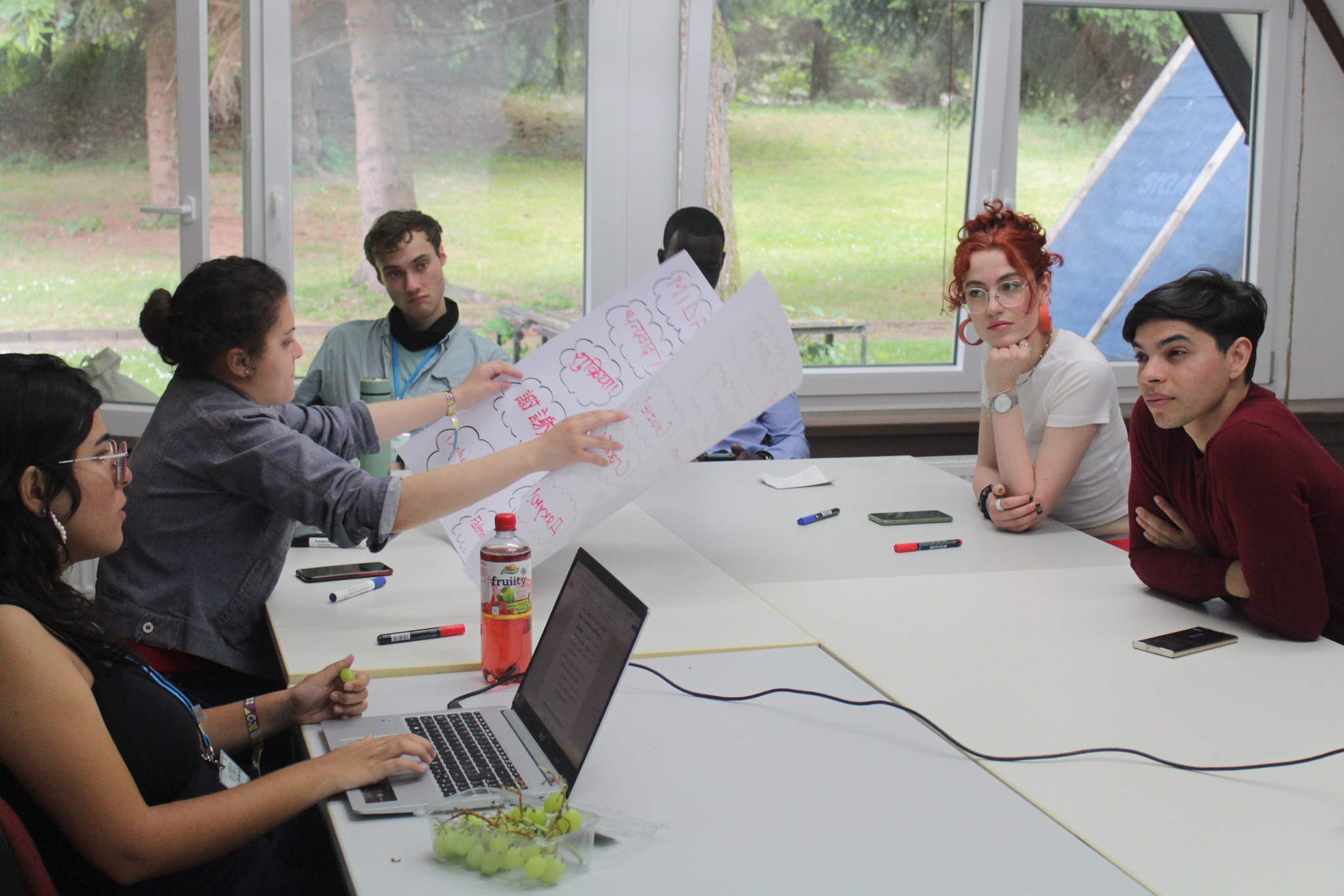Working Groups
Group work is the heart of ISWI. As of now we offer 15 working groups, each dealing with a certain aspect of the main topic of “Sharing Power, Giving opportunities and Enabling participation.” There are thematic groups and art groups. Within the group sessions, participants will have the possibility to share their experiences and views, discuss in detail and work towards solutions for current problems.
Education is constantly evolving, and the traditional model is being questioned by the challenges and opportunities of the 21st century. In this age of technological advancements and globalization, there is a need to rethink how we educate future generations. Is traditional education dynamic enough to prepare students for a rapidly changing world? How can we integrate experiential learning, emotional intelligence, and digital skills into curricula?
This group will explore alternative approaches and innovative models of teaching, aiming to redefine what quality education means today. Participants will discuss how universities can evolve, adapt to current times, and foster an environment where critical thinking and creativity are essential. Is the education system truly inclusive and capable of preparing students to tackle global issues?
Conflicts, both local and global, continue to be an integral part of our societies. However, the shift from conflict to constructive dialogue is crucial for peaceful resolution. This group will analyze how tensions can be transformed into opportunities for mutual understanding and cooperation. Open communication, empathy, and engagement are essential tools for the healing process.
What strategies are necessary to foster inclusive dialogue between different cultures, beliefs, and political positions? How can knowledge and information be used to promote peace and cooperation at the international level? Participants will also discuss the critical role universities play in conflict mediation and how students can be agents of change in this process.
Mental health is one of the most urgent challenges of our modern society. Despite progress, it remains a stigmatized and misunderstood topic. This group will address the importance of mental health and how access to proper education and resources can improve the lives of students and society in general. What impact does academic pressure and university life have on the mental health of students?
Participants will discuss the role of universities in providing a supportive environment for emotional well-being and how institutional policies can contribute to better mental health management. Additionally, the impact of technology and social media on mental health will be explored, and how safe spaces can be created for students to express their concerns.
Inclusion is not just an issue of equity, but also of unlocking the full potential of every individual. This group will analyze the importance of inclusive participation in various aspects of academic and social life. How can universities create environments where all students, regardless of their background, gender identity, sexual orientation, or abilities, feel truly included?
Through examining different forms of exclusion and discrimination, participants will explore ways to ensure that all students have equal opportunities to contribute, learn, and grow. The dialogue will focus on accessibility, equal opportunities, and representation in the academic space.
In an increasingly globalized world, economic systems often prioritize profit over people and the environment. This group will explore how economies can be restructured to be more just, fair, and sustainable for future generations. What role do universities play in shaping the future of sustainable business models, environmental policies, and fair trade practices?
Participants will examine how economic practices can balance profitability with social and environmental responsibility. The dialogue will focus on integrating sustainability into educational curricula and how students can become active contributors to shaping a fair and sustainable economy in both local and global contexts.
Migration is one of the most significant social phenomena in today’s world, influenced by globalization, conflicts, and economic disparities. This group will focus on the challenges and opportunities brought by migration, both for individuals and societies. How can universities prepare students to understand and address the complexities of migration and its social, cultural, and economic impacts?
Participants will explore how migration shapes local economies, cultural exchanges, and national policies. The group will also discuss the role of universities in promoting inclusivity, diversity, and mutual understanding in the context of globalization. Can universities act as spaces for cross-cultural dialogue and solutions to the challenges of migration?
The media has a profound influence on public opinion, political decisions, and societal norms. This group will investigate the ways in which media shapes perceptions and behaviors, both positively and negatively. What responsibility do media outlets have in ensuring accurate and fair representation, and how can we combat misinformation in the digital age?
Participants will explore how media influences everything from individual identity to global political dynamics. They will discuss the role of universities in fostering critical media literacy and empowering students to be discerning consumers of information. How can we use media as a tool for social change while remaining aware of its power to manipulate?
Youth and children are the future of society, and their opportunities for education, development, and participation have a profound impact on global progress. This group will focus on the challenges and opportunities facing young people today, especially in education, employment, and social integration. How can universities play a role in expanding opportunities for youth and children in marginalized or disadvantaged communities?
Participants will discuss the importance of access to quality education, vocational training, and equal opportunities for children and young people worldwide. The group will explore how students can actively contribute to initiatives that provide better prospects for youth and how universities can support the development of youth empowerment programs.
Students have the potential to drive change in both their universities and their societies. This group will explore the role of politics in student life, and how students can be empowered to become active participants in political and social change. How can universities foster an environment where students are encouraged to engage in political dialogue, activism, and leadership?
Participants will examine different forms of student activism and political engagement, and how these can influence decision-making processes within universities and beyond. The dialogue will focus on how students can advocate for their rights and interests, as well as how to overcome obstacles to student participation in political processes.
Building healthy, supportive relationships is essential for personal and academic success. This group will explore the dynamics of healthy relationships, both in personal life and within the academic environment. How can universities help students build skills for creating and maintaining relationships based on respect, trust, and mutual support?
Participants will reflect on the importance of communication, empathy, and boundaries in relationships. They will discuss how universities can play a proactive role in fostering emotional intelligence and conflict resolution skills among students. Additionally, the group will explore how social relationships can impact mental health and academic performance.
Volunteering offers individuals a unique opportunity to contribute to society while gaining personal growth and development. This group will examine the value of volunteerism in fostering social responsibility, community engagement, and the development of essential skills. How can universities encourage students to participate in volunteer work, and what impact does it have on both the individuals and the communities they serve?
Participants will explore various forms of volunteering, from local community efforts to international projects, and the benefits they provide to both volunteers and society. The dialogue will also discuss how universities can integrate volunteerism into their curricula and how volunteering can contribute to personal, academic, and professional development.
The documentation group plays a crucial role in capturing the essence of events, discussions, and ideas that arise throughout the conference. This group will focus on how to effectively document and communicate the outcomes of various sessions, making them accessible to a wider audience. What are the best practices for documenting information, and how can documentation contribute to knowledge sharing?
Participants will learn about various methods of documentation, including written reports, multimedia formats, and digital platforms. The group will also discuss the importance of documenting not only the events themselves but also the reflections and insights generated during the conference. How can documentation serve as a tool for ongoing dialogue and future learning?
The performing arts are a powerful way to communicate ideas, tell stories, and inspire action. This group will focus on how theater, dance, music, and other forms of performance can be used to address social, political, and cultural issues. How can the performing arts be utilized to educate and engage audiences in meaningful conversations?
Participants will explore the potential of performance as a tool for social change, reflecting on how it can challenge societal norms, encourage dialogue, and raise awareness of pressing global issues. The dialogue will also examine the role of universities in promoting and supporting the performing arts, and how this art form can help foster critical thinking and creativity among students.
How can visual storytelling help us share power and give voice to underrepresented perspectives? In this creative workshop, we’ll explore how photography and videography can foster empathy, encourage participation, and challenge social injustices. Through scriptwriting, framing, and editing, participants will learn how to turn ideas into impactful visuals that inspire dialogue and action. Everyone is welcome—regardless of experience—to help document diverse stories that matter and empower others through the lens.
Sustainability is a critical issue for the future of our planet and societies. This group will focus on how sustainability can be integrated into all aspects of life, from daily habits to global policies. How can universities contribute to a more sustainable future, both through their academic programs and their role in shaping student behavior?
Participants will examine the challenges of achieving sustainability, including the need for changes in consumption, energy use, and waste management. The discussion will also focus on how universities can lead by example and promote sustainable practices on campuses, in local communities, and globally. Additionally, the group will explore the role of students in driving sustainable change and how they can influence the future of sustainability in society.


